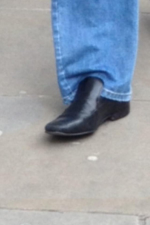You are using an out of date browser. It may not display this or other websites correctly.
You should upgrade or use an alternative browser.
You should upgrade or use an alternative browser.
Art vs Design
- Thread starter Corpsey
- Start date
mixed_biscuits
_________________________
pattycakes_
Can turn naughty
6:30am. Wake up to full potties and piss all over the toilet seat
The Higher Self perks up and whispers quietly “relax, you got this, just look at your Higher Self......”
View attachment 6106
On weekends
Murphy
cat malogen
Murphy
cat malogen
dont let them bully you Washyourhandses. you wear whatever makes you feel beautiful.
View attachment 6108
Newcastle, 1983
Murphy
cat malogen
From the Motherland
In their third incarnation as functioning members of the English manufacturing class, Manawydan and Pryderi become shoemakers. Manawydan figures that shoemakers aren't violent enough to cause them any trouble, and they set about making leather shoes. Here the text of Manawydan becomes intriguingly specific in its language of shoemaking. Manawydan buys ready-made leather rather than bothering to tan the stuff himself, and he's conscientious enough to buy the best cordwain for his shoes--except for the soles, which can be made of the cheap stuff. Naturally, the local shoemakers decide to do away with Manawydan and Pryderi, for whom the third time is the charm: they return to Wales.
luka
Well-known member
Just found this old piece by our patron saint. Gratifyingly sneering at graphic designers.we all know where your sympathies lie
blissblog
I wonder if there is also a question of time involved, a class-based relationship to the experiencing and management of time. Fisher, picking up on a point made by Sherburne, wonders whether the curious peaklessness of minimal (so similar to that other "global underground", Sasha/Digweed-style progressive) relates to "the libidinal cost of distending pleasure over the course of a twelve hour party." It's partly that, but also because the division between the ecstatically heightened timezone of "party" and normal existence is not as drastically demarcated.
"Creatives" have a different relationship to work and leisure than people who work in manufacturing or the service economy. There is a sense that they are rarely fully at work or fully at leisure. Because their jobs are more fulfilling, there is not the same sense of your-time-is-not-your-own, enforced boredom, nothing like the same alienation. The stress in this kind of work is often enjoyable stress: the challenges of solving problems, the adrenalin rush of the approaching deadline, the team-pulling-together-vibe at, say, a magazine when it's closing an issue and everyone's working until midnight. That kind of positive stress is virtually physiologically different to the cororonary-building kind of stress of being at the end of a supermarket or factory conveyor belt, subject to its rigid and inhuman flows (something I recall vividly from a summer spent as a student worker at the Wellcome plant in Berkhamsted, packing aerosols of insecticide into cardboard boxes). Also, if you work on a computer it's very easy to bunk off at frequent intervals, play truant into the web world, exactly as I am doing right now. At the same time, because their media or design jobs often involve aesthetics or some form of cultural information-gathering or semiotic interpretation, or networking, there is a sense that they are seldom completely at leisure. Work and leisure, the workspace and the homespace become blurred.* Especially if you are a freelancer and can manage your own time.
Because of all these factors, the whole explosive tension-release, living-for-the-weekend economy of energy that underpins the more tribal-vibal forms of dance culture is absent in minimal. It is much more about a plateau state of pleasure and pleasantness--the music coming through the speakers at the club not being that different from what you're playing all day through your computer speakers.
The weekend is not the redemption of a week of drudgery, because the work isn't actually drudgery, but stimulating. Because the weekend is not the focus to the same extent, there's no need to brock out, less pressure to release . The last time I was in Berlin, earlier this year, after the Rip it Up reading a bunch of us checked out some minimal bars, including one famous club, Watergate, with glass window walls overlooking the river. It was Wednesday and the place was pretty packed, full of people clearly there to dance until 6AM or later. On one level it was really cool to see people out and partying in the middle of week; on another there was that level, chugging thing to the music, the sense that there wasn't going to be a peak hour as such.
luka
Well-known member
Which I found via https://herbsundays.substack.com/p/...WP9aCrOA4Vz-YBVmTChTfAXHmWboyi8TUgCyHBg3tXUsk Which is a new mix Reynolds has done on the wheels of steel
shakahislop
Well-known member
wow that's good, dead on i thinkJust found this old piece by our patron saint. Gratifyingly sneering at graphic designers.

blissblog
blissout.blogspot.com
I wonder if there is also a question of time involved, a class-based relationship to the experiencing and management of time. Fisher, picking up on a point made by Sherburne, wonders whether the curious peaklessness of minimal (so similar to that other "global underground", Sasha/Digweed-style progressive) relates to "the libidinal cost of distending pleasure over the course of a twelve hour party." It's partly that, but also because the division between the ecstatically heightened timezone of "party" and normal existence is not as drastically demarcated.
"Creatives" have a different relationship to work and leisure than people who work in manufacturing or the service economy. There is a sense that they are rarely fully at work or fully at leisure. Because their jobs are more fulfilling, there is not the same sense of your-time-is-not-your-own, enforced boredom, nothing like the same alienation. The stress in this kind of work is often enjoyable stress: the challenges of solving problems, the adrenalin rush of the approaching deadline, the team-pulling-together-vibe at, say, a magazine when it's closing an issue and everyone's working until midnight. That kind of positive stress is virtually physiologically different to the cororonary-building kind of stress of being at the end of a supermarket or factory conveyor belt, subject to its rigid and inhuman flows (something I recall vividly from a summer spent as a student worker at the Wellcome plant in Berkhamsted, packing aerosols of insecticide into cardboard boxes). Also, if you work on a computer it's very easy to bunk off at frequent intervals, play truant into the web world, exactly as I am doing right now. At the same time, because their media or design jobs often involve aesthetics or some form of cultural information-gathering or semiotic interpretation, or networking, there is a sense that they are seldom completely at leisure. Work and leisure, the workspace and the homespace become blurred.* Especially if you are a freelancer and can manage your own time.
Because of all these factors, the whole explosive tension-release, living-for-the-weekend economy of energy that underpins the more tribal-vibal forms of dance culture is absent in minimal. It is much more about a plateau state of pleasure and pleasantness--the music coming through the speakers at the club not being that different from what you're playing all day through your computer speakers.
The weekend is not the redemption of a week of drudgery, because the work isn't actually drudgery, but stimulating. Because the weekend is not the focus to the same extent, there's no need to brock out, less pressure to release . The last time I was in Berlin, earlier this year, after the Rip it Up reading a bunch of us checked out some minimal bars, including one famous club, Watergate, with glass window walls overlooking the river. It was Wednesday and the place was pretty packed, full of people clearly there to dance until 6AM or later. On one level it was really cool to see people out and partying in the middle of week; on another there was that level, chugging thing to the music, the sense that there wasn't going to be a peak hour as such.





